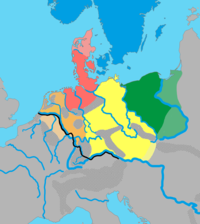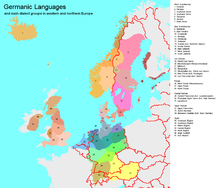
The Burgundians, Goths, and Vandals became linguistically assimilated by their respective neighbors by about the 7th century, with only Crimean Gothic lingering on until the 18th century. According to historical tradition, at least some of the Germanic tribes migrated to the mouth of the Vistula from Scandinavia. They came from one language , Proto- Germanic , and were originally spoken in Northern, Western and Central Europe. This division had begun by the 4th cent. German is one of the official and working languages of the European Union.

Minority Languages Spoken in Germany Low German. Each subfamily in this list contains subgroups and individual languages. Group I Gothic (Goths, Ostrogoths, Visigoths) Through MS such as the Codex Argenteus (Uppsala University Library) Gothic is reasonably well documented.
Because of the vast differences between the East and West German governments, they use of course, vastly different terms and acronyms to refer to their respective parts of government. The West government dominated after the unification, meaning that most of the East German political terms were flatly tossed aside. Revived Languages Gothic Crimean Gothic Vandalic Burgundian Most of these languages have been revived and a majority populace do not speak it. The Gothic Language was THE MOST IMPORTANT OF THE OLD GERMANIC LANGUAGES because: 1. It had the oldest written records – th – th c. Germanic languages continued to be spoken in the Germanic home lands of Scandinavia and central Germany, and are of course till spoken there today.
These include German and Dutch on the Continent, and the Scandinavian languages in the northern regions. Lists of vocabulary side-by-side in German , Dutch, and some Afrikaans. The East Germanic languages were marginalized from the end of the Migration period. Redirected from East Germanic languages ) The Germanic languages are a language family in the Indo-European languages. Definition of east germanic language in the Definitions.
Meaning of east germanic language. What does east germanic language mean ? Information and translations of east germanic language in the most comprehensive dictionary definitions resource on the web. The question of the dialectal nature of East Germanic remains a purely linguistic one, but I1-M2and R1a1a1b1a3-Z2lineages scattered throughout Europe seem to support the classical description of East Germanic tribes migrating from Scandinavia to the east of the Elbe, and thus its connection with the Nordic branch. Sometimes Different Words Meant the Same on Both Sides of the Wall.
Instances where different words are used to express the same meaning in East and West German language use can prove equally problematic. So far I have only studied languages in the Romance, Germanic and Slavic branches so that is what the following summaries will include. In spite of the linguistic similarities of the Slavic languages in culture, religion, history, and political tradition, these countries and peoples have followed different paths—paths that have frequently crossed in the creation and disintegration of empires in the constantly changing political landscape of Eastern Europe. Branches of the Germanic tree. The first language to split away was East Germanic.
The Goths, Gepids, Vandals and Burgundians all seem to have spoken forms of East Germanic , though the only written record is of Gothic. The Germanic peoples (also called Teutonic, Suebian, or Gothic in older literature) are an ethno-linguistic Indo-European group of northern European origin. They are identified by their use of Germanic languages , which diversified out of Proto- Germanic during the Pre-Roman Iron Age. Find all the synonyms and alternative words for east germanic language at Synonyms.
I was under the impression it was a very clear-cut Romance language. English synonyms, antonyms, and definitions. It was this language that the soldiers took with them and that interacted with native languages and the language of later invaders, particularly the Moors and Germanic invasions, to produce the Romance languages throughout the area that had once been the Roman Empire.
Welcome to Rutgers German ! After starting my German language studies in Germany, I was pleased to begin classes again at the East Melbourne Language Centre, with its highly experienced and effective teachers, and its fun classes. Learn German at the German Language Centre!
No comments:
Post a Comment
Note: Only a member of this blog may post a comment.